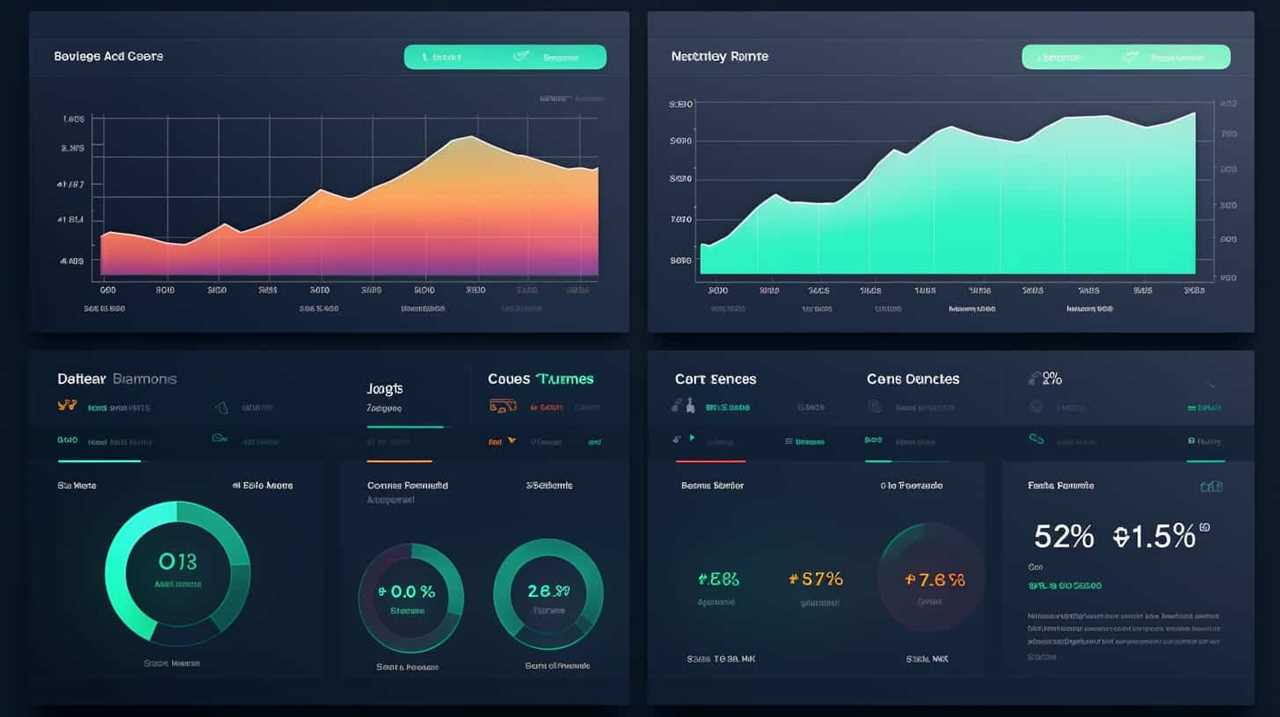Welcome to our guide on search engine optimization! Our aim is to simplify the complexities of SEO and highlight its significance in the modern digital era.
SEO, or search engine optimization, is like the compass that guides your online presence towards success. It involves optimizing your website to improve its visibility and ranking on search engine results pages.
By implementing SEO best practices, you can attract more organic traffic, boost your online visibility, and achieve measurable success.
Let’s dive in and master the art of SEO together!

Key Takeaways
- SEO refers to the practice of optimizing a website to improve its visibility and ranking on search engine results pages.
- SEO strategies require continuous monitoring and tweaking to adapt to changing search engine algorithms and user behaviors.
- Implementing effective SEO strategies is essential for increasing online visibility and achieving business goals.
- SEO improves organic search visibility, ensuring that a website appears on the first page of search engine results.
The Definition of SEO
SEO, or search engine optimization, refers to the practice of optimizing a website in order to improve its visibility and ranking on search engine results pages. It involves using various strategies and techniques to enhance a website’s online presence and attract more organic traffic.
SEO techniques encompass a wide range of activities, such as keyword research, on-page optimization, link building, and content creation. By implementing these techniques effectively, website owners can increase their chances of appearing higher in search engine rankings, ultimately driving more targeted traffic to their site.
SEO strategies involve developing a comprehensive plan to optimize a website, including identifying target keywords, optimizing website structure and content, and building high-quality backlinks. These strategies require continuous monitoring and tweaking to adapt to changing search engine algorithms and user behaviors.
Mastering SEO techniques and strategies is crucial for anyone looking to improve their website’s visibility and increase their online presence.

How Search Engines Work
To understand how search engines work, we need to delve into the intricacies of their algorithms and the way they analyze and rank websites.
Search engine algorithms are complex mathematical formulas that determine which websites are most relevant to a user’s search query. These algorithms consider various factors, such as keyword relevance, website authority, and user experience, to determine the ranking of a website in search results.
It’s crucial for website owners to optimize their websites for search engines to ensure they rank higher and attract more organic traffic. Optimizing a website involves techniques like keyword research, creating quality content, improving website speed, and optimizing meta tags.
The Importance of SEO
SEO plays a crucial role in website ranking and visibility on search engines. By optimizing your website for SEO, you can increase your chances of appearing higher in search engine results pages, attracting more organic traffic, and ultimately, driving more conversions.

The benefits of SEO are numerous, including improved user experience, increased brand credibility, and long-term cost effectiveness.
SEO for Website Ranking
For achieving higher rankings on search engines, we rely on the importance of SEO. Implementing effective SEO strategies and utilizing the right SEO tools can significantly impact website ranking.
Here are three key aspects to consider:
- Keyword Optimization: Conduct thorough keyword research and strategically incorporate relevant keywords into your website content. This helps search engines understand the purpose and relevance of your website.
- On-Page Optimization: Optimize your website’s structure, meta tags, headings, and URLs to make it more visible to search engines. Ensure that your content is well-structured, engaging, and easy to navigate.
- Link Building: Build high-quality backlinks from reputable websites to improve your website’s authority and credibility. This can be done through guest posting, social media promotion, and outreach campaigns.
By focusing on these SEO strategies and utilizing the right SEO tools, you can enhance your website’s ranking and increase organic traffic.

Transitioning into the subsequent section, let’s explore the benefits of SEO.
Benefits of SEO
After implementing effective SEO strategies and utilizing the right SEO tools, we can now delve into the benefits of SEO and its importance for website ranking.
SEO, or search engine optimization, offers numerous advantages for businesses and website owners. Firstly, SEO helps improve organic search visibility, ensuring that your website appears on the first page of search engine results. This increased visibility drives more targeted traffic to your site, resulting in higher conversion rates and increased sales.
Additionally, SEO helps build brand credibility and trust, as users tend to trust websites that appear at the top of search engine rankings. Moreover, SEO strategies, such as keyword optimization and content creation, enhance the user experience by providing relevant and valuable information.

Organic Vs. Paid Search Results
In our experience, we’ve found that the distinction between organic and paid search results is crucial for understanding the effectiveness of SEO strategies. Here are three key points to consider:
- Organic search results: These are the listings that appear naturally in search engine results pages (SERPs). They aren’t paid for and are based on factors like relevance and quality of content. Organic results are often considered more trustworthy and credible by users.
- Paid search results: Also known as paid advertising or pay-per-click (PPC), these are ads that appear at the top or side of SERPs. Advertisers bid on keywords and pay when their ad is clicked. Paid results provide immediate visibility and can be effective for driving traffic to a website.
- Finding the right balance: A successful SEO strategy involves a mix of organic and paid search results. While organic results can provide long-term benefits and establish authority, paid advertising can offer immediate visibility and targeted reach.
Understanding the differences between organic and paid search results is crucial in developing a comprehensive SEO strategy that maximizes visibility, credibility, and traffic to your website.
On-Page Optimization Techniques
When it comes to on-page optimization techniques, there are a few key points to consider.
First, meta tags play an important role in providing search engines with information about your webpage.

Second, strategically placing relevant keywords throughout your content can help improve your visibility in search results.
Lastly, optimizing your URL structure can make it easier for both search engines and users to understand the content of your webpage.
Meta Tag Importance
One of the key on-page optimization techniques in SEO is the use of meta tags, which play a crucial role in improving search engine visibility and click-through rates.
Here are three important aspects to consider when optimizing meta tags:

- Title Tag: The title tag is displayed as the clickable headline in search engine results. It should be concise, accurately describe the page content, and include relevant keywords.
- Meta Description: The meta description appears below the title tag in search engine results. It should be a compelling summary of the page content, enticing users to click through to your website.
- Meta Keywords: While meta keywords no longer carry as much weight in search engine rankings, it’s still helpful to include relevant keywords to give search engines a better understanding of your page content.
Optimizing meta tags with relevant keywords and compelling descriptions can significantly impact your website’s visibility and click-through rates.
Content Keyword Placement
Let’s dive into how content keyword placement can optimize your on-page SEO techniques.
Keyword research is a crucial step in developing effective SEO strategies. By strategically placing keywords throughout your content, you can improve the visibility and relevance of your website in search engine rankings.
When conducting keyword research, identify the most relevant and high-performing keywords for your industry. Then, incorporate these keywords naturally and strategically within your content. This includes placing them in the title, headings, and body of your text.

However, it’s important to avoid keyword stuffing, as search engines penalize websites for this practice.
By effectively placing keywords in your content, you can enhance your website’s visibility and attract more organic traffic.
Now, let’s move on to the next topic: URL structure optimization.
URL Structure Optimization
To further optimize our on-page SEO techniques, we’ll now delve into the importance of optimizing URL structure.

When it comes to URL structure best practices, there are several techniques that can greatly enhance your website’s SEO performance. Here are three key strategies to consider:
- Keep it concise: Short, descriptive URLs aren’t only user-friendly but also favored by search engines. Avoid using long strings of numbers or irrelevant characters in your URLs.
- Include keywords: Incorporating relevant keywords in your URL can help search engines understand the content of your page. Be sure to use hyphens to separate words for better readability.
- Avoid dynamic parameters: Dynamic parameters in URLs, such as session IDs or query strings, can confuse search engines and users alike. Opt for static URLs whenever possible to improve visibility and crawlability.
Off-Page Optimization Techniques
Off-page optimization techniques involve improving a website’s visibility and authority through external factors. These techniques play a crucial role in enhancing a website’s search engine rankings. Two important off-page optimization techniques are link building strategies and social media optimization.
Link building strategies focus on acquiring high-quality backlinks from reputable websites. These backlinks act as votes of confidence, signaling to search engines that your website is trustworthy and authoritative. Some effective link building strategies include guest blogging, creating shareable content, and reaching out to influencers or industry experts for collaborations.
Social media optimization involves leveraging social media platforms to increase brand visibility, engagement, and website traffic. By regularly posting relevant content, engaging with followers, and utilizing social media advertising, you can enhance your website’s online presence and attract more organic traffic.

By implementing these off-page optimization techniques, you can improve your website’s visibility, authority, and ultimately, its search engine rankings.
| Off-Page Optimization Techniques | Benefits |
|---|---|
| Link building strategies | Enhances website authority and credibility |
| Social media optimization | Increases brand visibility and organic traffic |
The Role of Keywords in SEO
Keywords play a crucial role in SEO as they help search engines understand the content of a webpage. Conducting thorough keyword research allows us to identify the most relevant and high-performing keywords to target.
Keyword Research Importance
When it comes to optimizing a website for search engines, understanding the importance of keyword research is crucial. Keyword research is the process of finding the right keywords that your target audience is using to search for your products or services. Here are three reasons why keyword research is important in SEO:
- Targeted Traffic: By using keyword research tools, you can identify the keywords that have high search volume and low competition. By targeting these keywords, you can attract more relevant traffic to your website, increasing your chances of converting visitors into customers.
- Long Tail Keywords: Long tail keywords are longer, more specific phrases that people use when they’re closer to making a purchase. By incorporating long tail keywords into your content, you can attract highly targeted traffic and increase your chances of conversions.
- Content Optimization: Keyword research helps you understand the language and words your target audience uses. By optimizing your content with relevant keywords, you can improve your website’s visibility in search engine results and attract more organic traffic.
Optimizing Content With Keywords
To effectively optimize content for search engines, it’s important to understand the role that keywords play in SEO. Keywords are the words and phrases that people use when searching for information online. By conducting thorough keyword research, you can identify the specific terms and phrases that are most relevant to your content and target audience. This allows you to strategically incorporate these keywords into your website content, blog posts, and other online materials.

The Significance of Backlinks
Backlinks play a significant role in SEO by improving a website’s visibility and authority. Here are three key reasons why quality backlinks are important for building backlinks for SEO:
- Enhanced Search Engine Rankings:
Backlinks act as a vote of confidence for search engines, indicating that your website is trustworthy and relevant. The more high-quality backlinks you have, the higher your website will rank in search engine results. - Increased Organic Traffic:
Backlinks from reputable websites can drive targeted traffic to your site. When other websites link to your content, it exposes your website to a wider audience, increasing the chances of attracting potential customers or readers. - Established Authority:
Backlinks help establish your website as an authority in your industry. When authoritative websites link to your content, it signals to users and search engines that your website is a reliable source of information.
SEO Best Practices
To optimize your website for search engines, we should focus on implementing SEO best practices.
SEO best practices refer to the strategies and techniques that can help improve your website’s visibility and ranking in search engine results pages (SERPs). These practices include:
- Keyword research and optimization
- Creating high-quality and relevant content
- Optimizing meta tags and descriptions
- Improving website speed and performance
- Using responsive design for mobile optimization
- Building high-quality backlinks
By following these best practices, you can increase your website’s chances of ranking higher in search results, attracting more organic traffic, and ultimately, driving more conversions and revenue.

It’s important to regularly update and adapt your SEO strategies to keep up with the ever-changing algorithms and trends in search engine optimization.
Measuring Success With SEO Metrics
We can measure the success of our SEO efforts by analyzing various metrics. Tracking success through SEO metrics is crucial to understand the effectiveness of our strategies and make data-driven decisions.
Here are three key metrics to consider:
- Organic Traffic: This metric tracks the number of visitors that come to your website through organic search results. It indicates how well your website is ranking and attracting relevant traffic.
- Conversion Rate: This metric measures the percentage of visitors who take a desired action on your website, such as making a purchase or filling out a form. It helps determine the effectiveness of your website in converting visitors into customers.
- Keyword Rankings: Monitoring your website’s keyword rankings allows you to see how well your SEO efforts are improving your visibility in search results. By tracking the positions of your target keywords, you can adjust your strategy accordingly.
Frequently Asked Questions
How Long Does It Take to See Results From SEO Efforts?
It usually takes a few months to see significant results from SEO efforts. However, measuring SEO success depends on various factors such as the competitiveness of keywords and the strategies for improving SEO rankings.

Are There Any Risks or Drawbacks Associated With Seo?
Are there any risks or drawbacks associated with SEO? We’re here to inform you. While SEO can greatly benefit your website, it’s important to consider potential risks such as penalties from search engines or the possibility of negative SEO tactics from competitors.
Is SEO Only Important for Large Businesses, or Can It Benefit Small Businesses as Well?
SEO is crucial for both large and small businesses. It helps small businesses attract local customers through targeted SEO strategies. Long tail keywords play a vital role in driving traffic and improving visibility for small businesses.
Can I Do SEO on My Own, or Do I Need to Hire a Professional?
Yes, we can definitely do DIY SEO, but hiring an SEO professional has its pros and cons. It’s important to weigh the benefits of saving time and effort versus the expertise and resources a professional can offer.
Are There Any Penalties or Consequences for Using Black Hat SEO Techniques?
There can be penalties and consequences for using black hat SEO techniques. Search engines may penalize your website by lowering its rankings or even removing it from search results altogether. It’s important to follow ethical SEO practices to avoid these repercussions.

Conclusion
In conclusion, SEO is the key to boosting your online visibility and reaching your target audience. By optimizing your website and using relevant keywords, you can improve your search engine rankings and drive organic traffic.
Backlinks play a crucial role in establishing your website’s authority and credibility. Remember to follow SEO best practices and regularly measure your success using metrics.
So, don’t let your website get lost in the vast online world; harness the power of SEO and watch your online presence soar like a rocket!









